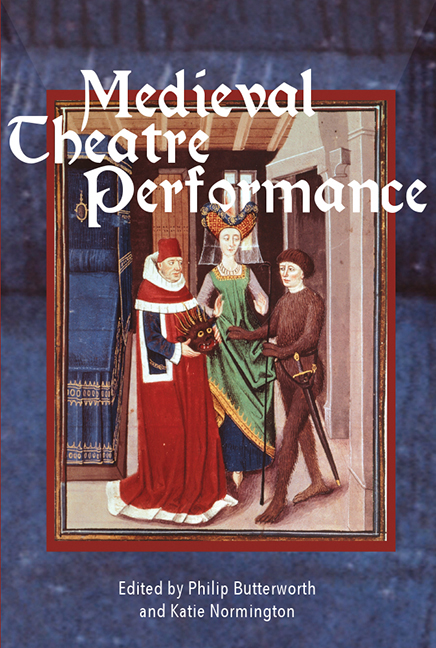Book contents
- Frontmatter
- Dedication
- Contents
- List of Illustrations
- Contributors
- Abbreviations of Principal Sources Cited
- Introduction
- Synopses
- 1 From Archive to Repertoire: The Disguising at Hertford and Performing Practices
- 2 Walk, Talk, Sit, Quit? On What Happens in Netherlandish Rhetoricians’ Plays
- 3 Performing Intrusions: Interaction and Interaxionality in Medieval English Theatre
- 4 Player Transformation: The Role of Clothing and Disguise
- 5 Pavilioned in Splendour: Performing Heaven in Fifteenth-Century Florence
- 6 Living Pictures: Drama without Text, Drama without Action
- 7 Performer-Audience Relationships in Fifteenth- and Sixteenth-century Danced Spectacles
- 8 Decadance in the Late Middle Ages: The Case of Choreomania
- 9 Writing, Telling and Showing Horsemanship in Rhetoricians’ Farce
- 10 Inanimate Performers: The Animation and Interpretive Versatility of the Palmesel
- 11 ‘lyke unto a lyvelye thyng’: The Boxley Rood of Grace and Medieval Performance
- 12 The Mechanycalle ‘Ymage off Seynt Iorge’ at St Botolph's, Billingsgate, 1474
- Bibliography
- Index
6 - Living Pictures: Drama without Text, Drama without Action
Published online by Cambridge University Press: 21 August 2018
- Frontmatter
- Dedication
- Contents
- List of Illustrations
- Contributors
- Abbreviations of Principal Sources Cited
- Introduction
- Synopses
- 1 From Archive to Repertoire: The Disguising at Hertford and Performing Practices
- 2 Walk, Talk, Sit, Quit? On What Happens in Netherlandish Rhetoricians’ Plays
- 3 Performing Intrusions: Interaction and Interaxionality in Medieval English Theatre
- 4 Player Transformation: The Role of Clothing and Disguise
- 5 Pavilioned in Splendour: Performing Heaven in Fifteenth-Century Florence
- 6 Living Pictures: Drama without Text, Drama without Action
- 7 Performer-Audience Relationships in Fifteenth- and Sixteenth-century Danced Spectacles
- 8 Decadance in the Late Middle Ages: The Case of Choreomania
- 9 Writing, Telling and Showing Horsemanship in Rhetoricians’ Farce
- 10 Inanimate Performers: The Animation and Interpretive Versatility of the Palmesel
- 11 ‘lyke unto a lyvelye thyng’: The Boxley Rood of Grace and Medieval Performance
- 12 The Mechanycalle ‘Ymage off Seynt Iorge’ at St Botolph's, Billingsgate, 1474
- Bibliography
- Index
Summary
This chapter considers the possibility that some performance records may refer to situations in which one of the two usual foundations of drama—text and action—appears to be lacking. I do not mean merely that records of the text or action have not survived, but that one of these elements was not a part of the original performance. There is an inherent difficulty in discussing such a possibility, since in many cases it requires the analysis not of what is contained in the documents, but of what is missing. Argumentum ex silentio is always a problematic proposition, and I will constantly emphasise the thin ice on which I am treading. We must be constantly aware that ‘absence of evidence is not evidence of absence’, as well as understanding that proving a negative is notoriously difficult if not, as some logicians would have it, impossible. My purpose here, though, is not to prove the existence of drama without text or action, but to put forward the possibility that this may be the most likely explanation of some situations that seem otherwise puzzling or inexplicable. It is hardly surprising that the thin evidence on which this discussion is based leads inevitably to a post-positive viewpoint of these texts, by which it is understood that a comprehensive view of the past is simply not possible. Such a viewpoint is articulated more fully by Claire Sponsler in her essay in this volume.
A brief survey of ‘drama’ as it appears in standard dictionaries and descriptive sources brings to light several assumptions about the nature of the genre. Two expectations predominate: drama is ‘a composition in prose or verse’, a phrase often expanded to ‘a literary composition’. Second, it is ‘adapted to be acted upon a stage’ or ‘intended to be acted upon the stage’. These expectations do not, of course, always apply to the reality of performance, whether in the Middle Ages or the twenty-first century. Examining their implications somewhat more closely, it is clear that the most significant result of categorising drama as a ‘composition’ or ‘literary composition’ is the assumption that it is centred on a text; since that text is both ‘composed’ and ‘literary’, the suggestion seems strong that it pre-exists performance.
- Type
- Chapter
- Information
- Medieval Theatre PerformanceActors, Dancers, Automata and their Audiences, pp. 107 - 122Publisher: Boydell & BrewerPrint publication year: 2017



